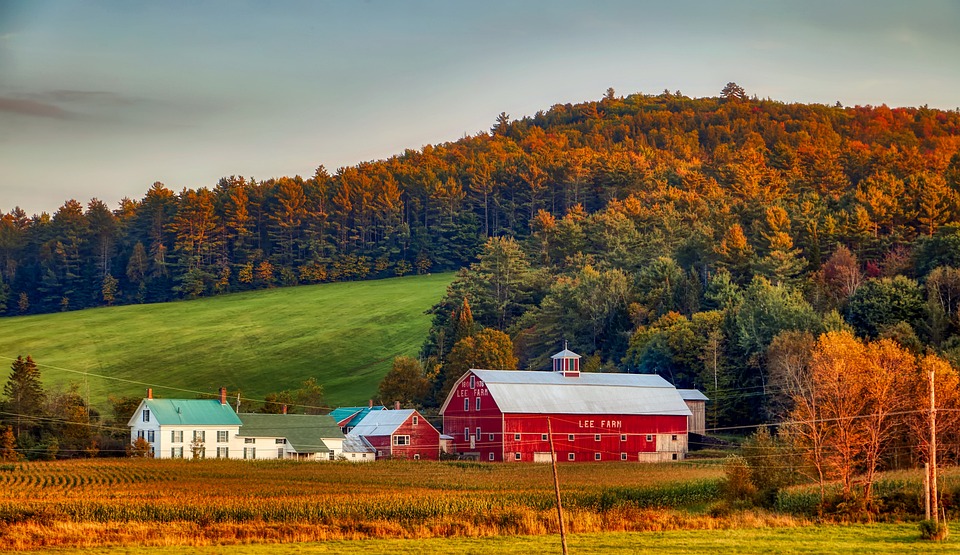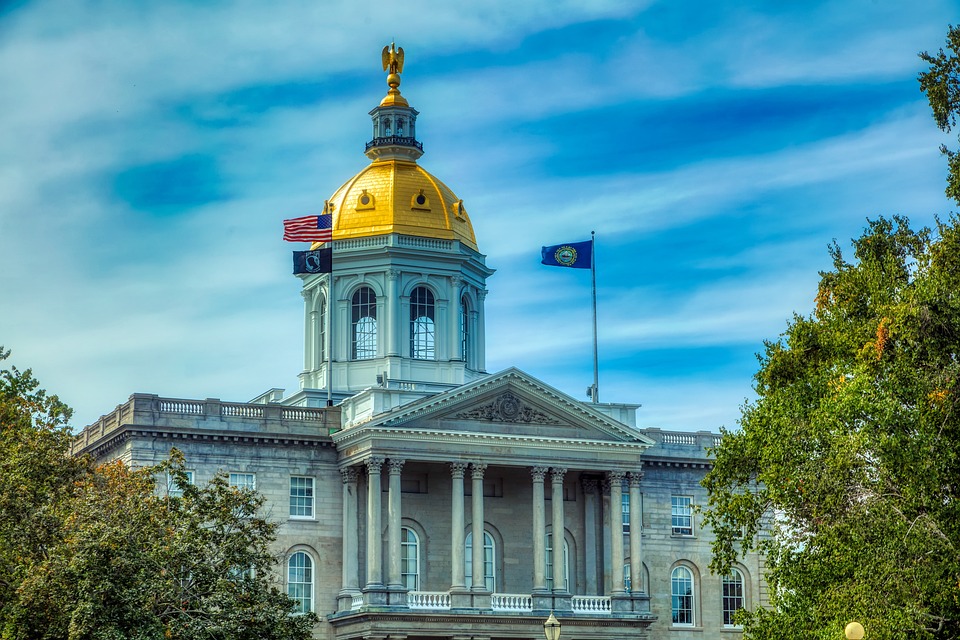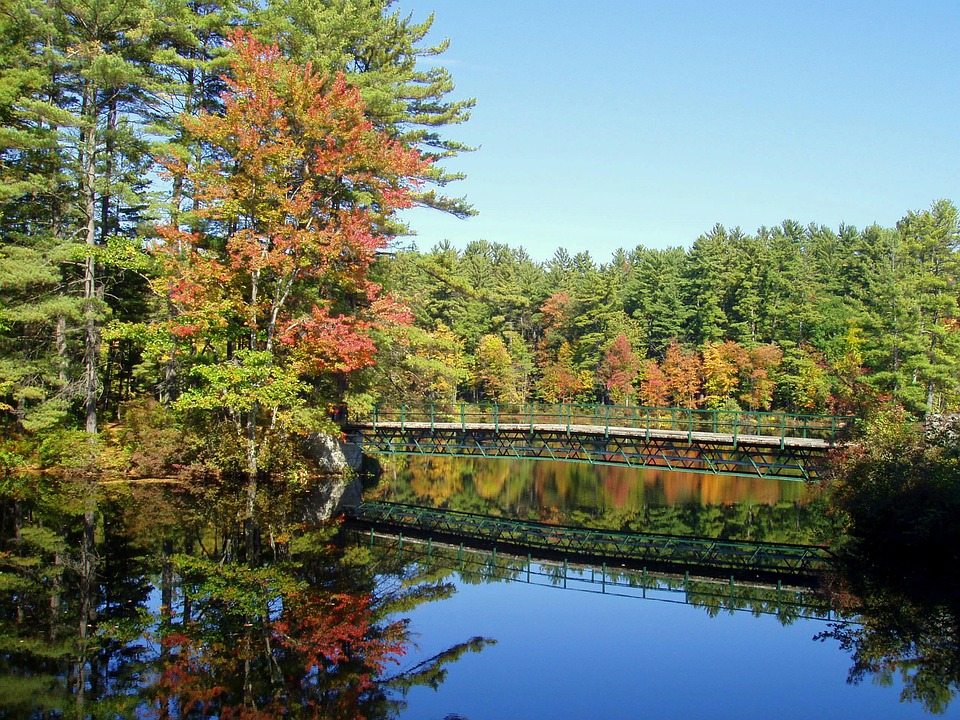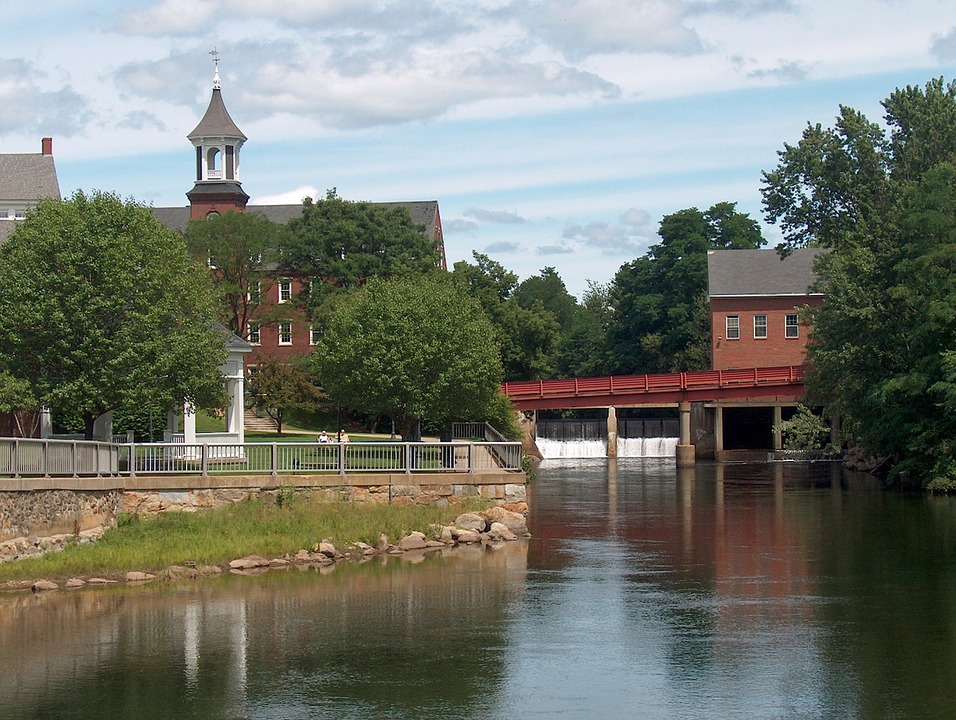New Hampshire state (USA)

Location
New Hampshire is located in the northeastern United States and is part of the New England region. It borders Canada (Quebec) to the north, Maine and the Atlantic Ocean to the east, Massachusetts to the south, and Vermont to the west. New Hampshire is one of the smallest U.S. states by area, covering approximately 24,214 square kilometers. The state capital is Concord, while its largest city, Manchester, serves as a significant economic hub. Geographically, New Hampshire spans diverse natural areas, from coastal plains in the east to the White Mountains in the north, which are especially popular among tourists for their picturesque scenery.
Climate and Landscape
New Hampshire’s climate is continental, characterized by warm summers and cold winters, making it ideal for those who enjoy seasonal changes. In the summer, average temperatures reach around 25°C, although high-altitude areas can be cooler. Winters are quite cold, with average temperatures dropping to -15°C, particularly in the northern regions. Heavy snowfall makes New Hampshire a popular destination for winter sports, such as skiing and snowboarding. The state’s landscape features a variety of natural environments, including coastlines, dense forests, high mountains, and numerous lakes. One of New Hampshire’s most famous natural landmarks is Mount Washington, the highest peak in the northeastern U.S., renowned for its extreme weather conditions, which attract adventurers and tourists from around the world.
Population
The population of New Hampshire is approximately 1.4 million, placing it among the least populous states in the U.S. However, the state has a relatively high population density due to its urban areas, such as Manchester, Nashua, and Concord. Here’s a more detailed look at the ethnic composition and population distribution by city:
- Ethnic Composition:
- White Population: Over 90% — New Hampshire is one of the most ethnically homogeneous states.
- Hispanics/Latinos: About 4% — this group has grown due to recent migration and the rising number of young families.
- Asians: Around 2% — particularly Indian and Chinese communities, which are growing, especially in cities with large educational and research institutions.
- African Americans: Approximately 1.5% — a small but steadily growing group, mostly centered in Manchester and surrounding areas.
- Other Ethnic Groups: Up to 2% — includes Native Americans, Middle Easterners, and others.
- Major Cities:
- Manchester (over 110,000 residents) — the largest city in the state and an economic center with the most diverse population.
- Nashua (about 90,000 residents) — known for its industrial sector and growing cultural community.
- Concord (around 44,000 residents) — the state capital with rich history and political significance, where much business activity takes place.
- Derry and Rochester (about 33,000 and 32,000 residents, respectively) — less urbanized but attractive for living, with strong local cultural influences.

Crime
New Hampshire is one of the safest states in the United States, with a very low crime rate. The violent crime rate is approximately 152 per 100,000 people, one of the lowest in the country. Larger cities, such as Manchester, have slightly higher rates, but overall the state is known for its safety, which makes it appealing to families and retirees. Most crimes in the state are minor offenses, such as theft, while serious crimes are very rare. New Hampshire also ranks among the top states for public trust in law enforcement, which contributes to a strong sense of safety among residents.
Economy
New Hampshire’s economy is characterized by high-income levels, a stable labor market, and low unemployment rates. The state boasts one of the highest average wages in the country, making it economically appealing for new residents and businesses. The average hourly wage is around $12, though in sectors such as technology, healthcare, and education, wages are significantly higher. New Hampshire has one of the lowest poverty rates in the U.S. at around 7.6%, well below the national average. Unemployment in the state remains consistently low, at about 2-3%, indicating a healthy and well-developed labor market.
The major sectors driving New Hampshire’s economy include manufacturing, healthcare, education, technology, tourism, and agriculture. With its rich natural resources, the state also actively promotes tourism, attracting visitors to its mountain resorts, lakes, and historical sites. Small businesses are essential to the state’s economy, particularly in areas like crafts, food production, and local services.
New Hampshire for Business
New Hampshire offers a favorable environment for entrepreneurs and companies due to its tax policies and the absence of many regulatory burdens common in other states. The state actively supports medium and small businesses, attracting investments and creating incentives for growth.
Major Companies and Industries
New Hampshire is home to several major and well-known companies, especially in manufacturing, technology, and healthcare:
- BAE Systems – a defense and aerospace technology company, providing thousands of jobs and significant investment in the high-tech sector.
- Fidelity Investments – one of the largest investment firms, with a major office in New Hampshire, supporting growth in finance and tech professions.
- Timberland – an apparel and footwear manufacturer founded in New Hampshire, known for eco-friendly products and global popularity.
- Lonza Group – a Swiss biotech company with a strong presence in New Hampshire, supporting the biotech and pharmaceutical sector.
Additionally, New Hampshire has a strong presence of companies in manufacturing, electronics, engineering, and education. The state is also attractive to startups in tech and finance sectors due to tax preferences.
Tax Benefits and Drawbacks
New Hampshire is known as a tax-friendly haven for businesses:
- No personal income tax (except on dividends and interest). This allows residents to keep more of their earnings, creating attractive conditions for highly skilled professionals.
- No sales tax. This reduces the overall cost of goods and services, a major advantage for businesses, especially in retail and services.
- Corporate tax at 7.7%, slightly above the national average, but often offset by low administrative costs and the absence of other regulatory fees.
- Dividends and interest tax at 5%. Although New Hampshire does not impose a standard income tax, it taxes dividends and interest, which can be a drawback for investors and those with passive income, but this tax is scheduled to be gradually reduced by 2025.
Potential Challenges for Business
While New Hampshire’s tax structure is advantageous, there are also challenges to doing business in the state:
- High cost of living and real estate. Due to high demand and limited supply, rental and purchase prices for real estate are high, especially in cities like Manchester and Nashua. This can affect company costs and pose challenges for employees.
- Limited labor market. With low unemployment, some companies face challenges in recruiting mid-level and senior-level employees. This is particularly relevant for businesses in technology and healthcare that seek highly skilled professionals.
- Seasonal limitations in tourism and retail. Although New Hampshire’s tourism industry is well-developed, it experiences seasonal peaks, which can affect revenues during winter or summer. Businesses relying on tourists or seasonal visitors need to adapt their models to maintain steady income.
Real Estate
The real estate market in New Hampshire is stable, but housing prices are somewhat higher than the national average, especially in high-demand cities like Manchester, Nashua, and Portsmouth. The median home price in the state is around $400,000, making it a significant investment for most families. Rental prices are also high; a one-bedroom apartment in Manchester typically costs between $1,200 and $1,500 per month, while prices in Portsmouth are even higher due to its coastal proximity and attractive lifestyle.
- Manchester offers a range of real estate options from modern apartments to mid-range houses, but demand is high, driving up prices.
- Nashua is popular for rentals and home purchases, particularly for those who work in Boston, as it is close to the Massachusetts border.
- Portsmouth is known for its coastal charm, but this also means higher housing costs. It is suitable for those seeking a home in an exclusive area and willing to pay for the location.
Ecology
New Hampshire’s ecology is a significant aspect, as the state actively supports conservation initiatives. With scenic landscapes and popular tourist destinations like the White Mountains and Lake Winnipesaukee, environmental concerns are given particular importance. The state implements programs to protect forests, water bodies, and parks, maintaining a healthy balance between tourism and conservation.
The state attracts substantial investments in natural resource conservation, making it one of the most environmentally friendly regions in the U.S. However, the development of new industrial facilities and the annual influx of tourists present certain challenges, so environmental initiatives here always require further enhancement.

Notable Places
New Hampshire is known for its captivating natural and historical landmarks that attract tourists from across the U.S. and around the world. The state offers various opportunities for outdoor activities, cultural events, and exploring regional history. Here are a few must-visit places:
- White Mountains – The state’s primary mountain range, famous for its hiking trails, ski resorts, and scenic views. This area includes Mount Washington, the highest peak in the eastern U.S., known for its unpredictable weather.
- Lake Winnipesaukee – The largest lake in New Hampshire, popular among enthusiasts of water sports, fishing, and outdoor leisure. The lake is surrounded by resorts and picturesque small towns.
- Portsmouth – A coastal town with a rich history, featuring numerous colonial-era buildings, museums, restaurants, and shops. The historic streets and ocean views create a unique atmosphere.
- Franconia Notch State Park – A state park known for its rock formations and waterfalls, ideal for hiking and enjoying scenic landscapes.
- Kancamagus Highway – A scenic route that winds through mountains and forests, especially popular in the fall when the trees change colors.
In addition, New Hampshire is famous for its festivals and cultural events held throughout the year, including farmers’ markets, craft fairs, and music festivals.
Why People Move to New Hampshire
New Hampshire offers attractive living conditions thanks to its high quality of life, lack of income and sales taxes, good ecology, and cultural environment. Here are some of the main reasons people choose this state as their new home:
- High Quality of Life: With no income tax and low crime rates, the state is appealing to families and retirees. Residents also appreciate the peaceful and comfortable lifestyle.
- Natural Beauty and Outdoor Activities: New Hampshire is rich in national parks, lakes, and mountains, providing ample opportunities for outdoor recreation, including hiking, skiing, and water sports.
- Proximity to Major Cities: The state is located close to Boston and other metropolitan areas, allowing residents to work or study in these cities while enjoying a quieter and more affordable living environment.
- Quality Education: New Hampshire is known for its high educational standards, especially in primary and secondary schools, which is essential for families with children.
- Business-Friendly Environment: With low taxes and strong support for small businesses, New Hampshire is attractive for entrepreneurs seeking favorable conditions to start their ventures.

Potential Drawbacks of Living in New Hampshire
Despite numerous advantages, life in New Hampshire may present certain challenges, especially for newcomers. Here are some key considerations when thinking about relocating to this state:
- High Cost of Housing: Real estate prices in New Hampshire are on the rise due to high demand and limited supply, particularly in popular cities like Portsmouth, Manchester, and Nashua. This can be a financial challenge for new residents looking to purchase or rent a home, especially in coastal or tourist areas.
- Limited Access to Specialized Healthcare: While general healthcare services in the state are of good quality, specialized medical services can be hard to access due to the limited number of facilities. This means that for complex procedures or consultations, some residents may need to travel to neighboring states, such as Massachusetts, which can be inconvenient.
- Seasonal Nature of Tourism: Tourism, while beneficial to the state’s economy, is highly seasonal. The peak tourist seasons are summer and fall, while winter months see fewer visitors. This means that tourism-dependent businesses may face fluctuating income, which could affect employment and income stability within this sector.
- Weather Extremes: New Hampshire’s climate can be unpredictable, with cold winters and high humidity in summer. While many residents appreciate the distinct seasonal changes, newcomers may need time to adjust to the winter cold and heavy snowfall, especially if they are relocating from warmer regions.
- Social Conservatism: New Hampshire is a sparsely populated state, and for newcomers, integrating into the local community can be challenging. In smaller towns, local communities often have established social networks, and newcomers may need time to find their social circle.
Overall, while New Hampshire offers many benefits, certain aspects of the state may require adaptation and consideration in personal planning. However, for many, these drawbacks are outweighed by the quality of life, environmental cleanliness, and economic opportunities the state provides.
Table of Contents